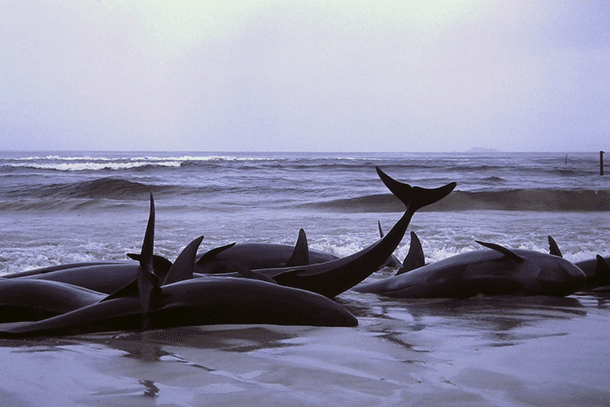The US Navy agrees to limit the use of sonar and explosives in key whale habitat
Sonar and other loud ocean sounds can cause whales to beach themselves.
Whales off the coast of southern California and Hawaii recently won a modest victory in the courtroom. In response to a lawsuit brought by the Natural Resources Defense Council, the US Navy has agreed to restrict its use of damaging sonar and explosives in key whale habitat.
“We identified areas in Hawaii and Southern California that are important to marine mammals and many of those were set aside [and] the Navy will no longer conduct those kinds of activities,” explains Zak Smith, a senior attorney with NRDC. “We also got an agreement that should help reduce the incidence of ship strikes, which are problematic for blue whales and other great whales that migrate along California's coast."
The journey to the lawsuit began in 2000, Smith says, when there was a mass stranding of beached whales and other species in the Bahamas. Very quickly, some scientists started to link the incident to the Navy's use of sonar in that area. Over time, the Navy and the National Marine Fisheries Service conducted their own research, which concluded that sonar was, in fact, the cause of these strandings and deaths.
Sonar can have a range of impacts on marine mammals, Smith says.
“On one end of the scale, you have outright death. If whales are close enough to a high-intensity sonar source, it can lead to internal organ damage," Smith says. "There are also indications of bleeding from the ears and the eyes. Those kinds of impacts at the very closest range are the most horrible ones.”
Further away from the source, whales can suffer permanent or temporary hearing loss, which is incredibly bad for marine mammals.
“They depend upon hearing for all of their interactions in the environment,” Smith explains. “The ocean is a very dark place after you get down deep enough, where they spend most of their time. Many scientists have said that a deaf whale is a dead whale, so even temporary hearing loss is very concerning.”
Scientists see less direct physical damage from sonar at greater distances, but significant behavioral disruptions to whale communities still occur, including habitat abandonment and interrupted feeding opportunities. Over time, these kinds of things can have a negative impact on the survival of whale populations, Smith says.
Two years ago, NRDC sued the Navy over its five-year plan to conduct training and testing activities in Southern California and Hawaii, claiming the Navy had not prepared adequate measures to protect marine mammals. The Navy’s own models estimated more than 9.5 million incidences of harmed mammals would occur over that period, Smith says.
The NRDC won in court on all claims under the Endangered Species Act and the Marine Mammal Protection Act.
“It's a huge victory for conservation of marine mammals because, for the first time, it asks, ‘How can we achieve our national security goals and our training goals while at the same time maximizing protection for marine mammals?” Smith says.
The Navy and the fisheries service are now sitting down and looking at biologically important areas that have been identified within their ranges and trying to determine if they can be set aside or if other steps can be taken to limit harm, Smith says.
“The Navy had been resisting doing this for years, so it's incredibly significant,” Smith says. “The kind of collaborative effort that we were able to achieve through this settlement is something we can take to the other ranges where the Navy conducts its activities. … It’s a model that should be used for the Navy going forward and could be applicable to other agencies as they plan activities along our coasts.”
This article is based on an interview that aired on PRI's Living on Earth with Steve Curwood.
